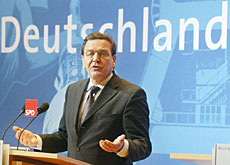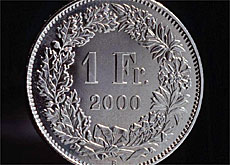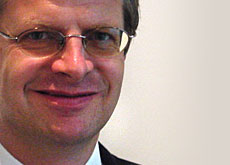Economy to remain in the doldrums

No turnaround is in sight for the Swiss economy in 2003, with economists at Goldman Sachs predicting growth of "only 1.1 per cent".
The investment bank said Switzerland would continue to suffer from the depressed global environment this year.
In its European Weekly Analyst research publication, devoted to issues and the outlook for 2003, the bank said problems for the Swiss economy have been compounded by the overvaluation of the Swiss franc, which has been supported by safe haven capital flows.
The bank’s economic researchers expect only a gradual pick-up in activity during 2003, with interest rates remaining close to current levels for most of the year.
It points out that the Swiss National Bank has battled to offset the tightening of monetary conditions, cutting interest rates by half a per cent during 2002 to a target range of 0.25 – 1.25 per cent.
Economic growth is likely to increase, they say, by “only 1.1 per cent” this year.
They argue that low interest rates will support investment and offset the negative impact of higher unemployment on consumer spending.
Weak demand
Exports are expected to improve only gradually because demand from Switzerland’s main trading partners, in particular Germany, is likely to remain weak.
The analysts at Goldman Sachs say the main threat to GDP growth comes from the global environment.
The possibility of a United States-led attack on Iraq, fears of terrorist attacks and risks of a slump in equity markets are all “ingredients” that could generate a double dip recession in Switzerland.
And they maintain that with interest rates already below one per cent, there is little room left for further monetary easing in response to a further strengthening of the franc.
The study says that although the Swiss economy faces some deflationary risk, this should not be overstated since the usual symptoms of a domestic-based deflation are absent.
Banking secrecy
Banking secrecy is set to remain in the spotlight, the researchers feel, as the European Union continues its efforts to harmonise the taxation of savings income among member states.
Talks between Switzerland and the EU on a draft EU directive requiring the exchange of information on non-residents’ savings accounts from 2004 have so far failed.
Switzerland has repeatedly said that it cannot agree to an automatic exchange of information because this would contravene its banking secrecy laws, which it has stressed, are not negotiable.
Bern has proposed levying a withholding tax of up to 35 per cent on EU residents’ savings earnings, with 75 per cent of revenues envisaged going to the EU, as an alternative to the information exchange.
But Bern has agreed to exchange information in cases of tax fraud, offering what is called administrative assistance to EU member states in double taxation conventions, on the basis of reciprocity.
Insufficient
Austria, Belgium and Luxembourg have said they consider the Swiss offer insufficient because they fear that their banking systems will be weakened due to flights of capital to Switzerland, where banking secrecy would be maintained.
The study feels that it is “unlikely” that Switzerland will agree to a proposal that would weaken its banking secrecy when the negotiations between the two sides resume on January 21, adding that it will be difficult to reach a deal.
The analysts feel that the efforts of Germany to repatriate funds that have been invested abroad to evade tax at home is likely to have a larger impact on the Swiss banking sector.
But they add that they do not expect major flows out of the sector as Swiss banks’ expertise in fund and private wealth management means that they will still probably be able to manage this capital locally.
swissinfo
Goldman Sachs predicts growth of just 1.1 per cent in Switzerland in 2003.
Its economists say the depressed global environment will keep Swiss interest rates at their current low levels.
They caution that economy faces some deflationary risk but this should not be overstated.
Inflation in Switzerland averaged 0.6 per cent last year, down from one per cent in 2001.
A deal between Switzerland and the European Union on the taxation of savings earnings is seen as unlikely in the near future.

In compliance with the JTI standards
More: SWI swissinfo.ch certified by the Journalism Trust Initiative




You can find an overview of ongoing debates with our journalists here. Please join us!
If you want to start a conversation about a topic raised in this article or want to report factual errors, email us at english@swissinfo.ch.